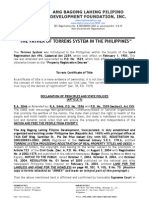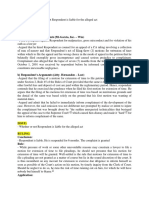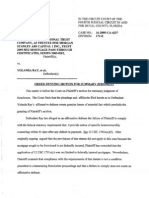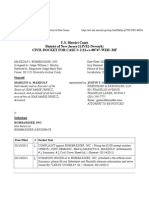0 ratings0% found this document useful (0 votes)
138 viewsLozano V Quevedo
Lozano V Quevedo
Uploaded by
MikkoThe newspaper El Pueblo published an article written by Anastacio Quevedo about a secret investigation being conducted by the Solicitor-General into allegations against a Judge of First Instance. The complainant attorney alleged the article contained false and malicious facts that took sides with the respondent judge and was intended to influence the investigation. The court found Severino Lozano, the editor of El Pueblo, and Anastacio Quevedo guilty of contempt of court because publishing details of confidential legal proceedings can impede and embarrass the administration of justice. The court ordered each to pay a nominal fine of 20 pesos within 15 days.
Copyright:
© All Rights Reserved
Available Formats
Download as DOCX, PDF, TXT or read online from Scribd
Lozano V Quevedo
Lozano V Quevedo
Uploaded by
Mikko0 ratings0% found this document useful (0 votes)
138 views1 pageThe newspaper El Pueblo published an article written by Anastacio Quevedo about a secret investigation being conducted by the Solicitor-General into allegations against a Judge of First Instance. The complainant attorney alleged the article contained false and malicious facts that took sides with the respondent judge and was intended to influence the investigation. The court found Severino Lozano, the editor of El Pueblo, and Anastacio Quevedo guilty of contempt of court because publishing details of confidential legal proceedings can impede and embarrass the administration of justice. The court ordered each to pay a nominal fine of 20 pesos within 15 days.
Original Description:
Case digests
Original Title
Lozano v Quevedo
Copyright
© © All Rights Reserved
Available Formats
DOCX, PDF, TXT or read online from Scribd
Share this document
Did you find this document useful?
Is this content inappropriate?
The newspaper El Pueblo published an article written by Anastacio Quevedo about a secret investigation being conducted by the Solicitor-General into allegations against a Judge of First Instance. The complainant attorney alleged the article contained false and malicious facts that took sides with the respondent judge and was intended to influence the investigation. The court found Severino Lozano, the editor of El Pueblo, and Anastacio Quevedo guilty of contempt of court because publishing details of confidential legal proceedings can impede and embarrass the administration of justice. The court ordered each to pay a nominal fine of 20 pesos within 15 days.
Copyright:
© All Rights Reserved
Available Formats
Download as DOCX, PDF, TXT or read online from Scribd
Download as docx, pdf, or txt
0 ratings0% found this document useful (0 votes)
138 views1 pageLozano V Quevedo
Lozano V Quevedo
Uploaded by
MikkoThe newspaper El Pueblo published an article written by Anastacio Quevedo about a secret investigation being conducted by the Solicitor-General into allegations against a Judge of First Instance. The complainant attorney alleged the article contained false and malicious facts that took sides with the respondent judge and was intended to influence the investigation. The court found Severino Lozano, the editor of El Pueblo, and Anastacio Quevedo guilty of contempt of court because publishing details of confidential legal proceedings can impede and embarrass the administration of justice. The court ordered each to pay a nominal fine of 20 pesos within 15 days.
Copyright:
© All Rights Reserved
Available Formats
Download as DOCX, PDF, TXT or read online from Scribd
Download as docx, pdf, or txt
You are on page 1of 1
In Re Lozano [54 Phil. 801.
July 24, 1930]
16OCT
Ponente: MALCOLM, J.
FACTS:
Sometime ago, the complaint of an attorney against a Judge of First Instance was by resolution of this
court referred to the Attorney-General for investigation, report, and recommendation. The SolicitorGeneral was designated to conduct the investigation of the charges, and pursuant to said designation,
proceeded to the municipality of Capiz, Province of Capiz, to take the testimony of certain witnesses. The
investigation was conducted secretly, as is customary in cases of this character. Notwithstanding, on April
29, 1930, El Pueblo, a newspaper published in Iloilo and edited by Severino Lozano, printed an account
of the investigation written by Anastacio Quevedo, said to be an employee in the office of the Judge under
investigation.
The article purports to give an account of the evidence of the different witnesses. Regarding this account,
the complainant attorney alleges that the facts therein contained are false, malicious, and untrue and
that said report took sides with the respondent judge . . . and expressed an opinion as to the merits of the
same, with the object undoubtedly, to influence the action of the investigator and the public in general and
to obstruct, embarrass or impede the course of the present investigation. In the same connection, the
Attorney-General states that the newspaper report does not contain a fair and true account of the facts
disclosed at the investigation, . . . creating a wrong impression in the mind of the public and tending to
influence improperly the action of this court in the said pending matter. Under the circumstances, the
observations of the Attorney-General must necessarily be accepted as true.
ISSUE:
Whether or not Severino Lozano and Anastacio Quevedo are guilty of contempt of court.
HELD:
YES. Court ordered each to pay the court a nominal sum of twenty pesos (P20) within fifteen (15) days.
RATIO:
The rule is well established that the newspaper publications tending to impede, obstruct, embarass, or
influence the courts in administering justice in a pending suit or proceeding constitute criminal contempt
which is summarily punishable by the courts. The rule is otherwise after the cause is ended. It is also
regarded as an interference with the work of the courts to publish any matters which their policy requires
should be kept private, as for example the secrets of the jury room, or proceedings in camera.
The liberty of the citizen must be preserved in all of its completeness. But license or abuse of liberty of the
press and of the citizen should not be confused with liberty in its true sense. As important as is the
maintenance of the Judiciary. Respect for the Judiciary cannot be had if persons are privileged to scorn a
resolution of the court adopted for good purposes, and if such persons are to be permitted by
subterranean means of diffuse inaccurate accounts of confidential proceedings to the embarrassment of
the parties and the courts
You might also like
- Burbe V Magulta Case DigestDocument1 pageBurbe V Magulta Case DigestColeenNo ratings yet
- Motion To Reset Hearing Harold MiradorDocument2 pagesMotion To Reset Hearing Harold MiradormajoyNo ratings yet
- The Father of Torrens System in The PhilippinesDocument15 pagesThe Father of Torrens System in The PhilippinesRomeo A. Garing Sr.92% (12)
- Constitutional Law 1 Codal Notes and ReviewerDocument33 pagesConstitutional Law 1 Codal Notes and ReviewerJose Joven Paulo Espinosa80% (5)
- Legal Ethics Review Complete Case Digest PDFDocument252 pagesLegal Ethics Review Complete Case Digest PDFMecah BonitaNo ratings yet
- ENDAYA V. DigestDocument2 pagesENDAYA V. DigestJulianne MainesNo ratings yet
- Guerrero VS VillamorDocument3 pagesGuerrero VS Villamorkent babsNo ratings yet
- 057 Guerrero VDocument2 pages057 Guerrero VJacob DalisayNo ratings yet
- Mary Ann Mattus vs. Albert VilasecaDocument1 pageMary Ann Mattus vs. Albert VilasecaYahiko YamatoNo ratings yet
- Plus Builders Vs Atty. RevillaDocument1 pagePlus Builders Vs Atty. RevillaJeka AdvinculaNo ratings yet
- Ac 3701 PNB V Cedo Case ReportDocument2 pagesAc 3701 PNB V Cedo Case ReportJen DioknoNo ratings yet
- Sanchez V TorresDocument5 pagesSanchez V TorresJill BetiaNo ratings yet
- Viduya vs. BerdiagoDocument14 pagesViduya vs. BerdiagoAustine CamposNo ratings yet
- Case Digests On Local TaxationDocument12 pagesCase Digests On Local TaxationKristine Jay Perez-CabusogNo ratings yet
- Castaneda V AgoDocument2 pagesCastaneda V Agoglewin nikolais DavidNo ratings yet
- BLE11 - OCA - V - Atty - LadagaDocument1 pageBLE11 - OCA - V - Atty - LadagaCedric KhoNo ratings yet
- Enriquez Vs CaminadeDocument3 pagesEnriquez Vs Caminadearcheee2345No ratings yet
- Occena vs. MarquezDocument4 pagesOccena vs. MarquezGodofredo Ponteras IIINo ratings yet
- Digest CIR Vs ESSO - Ong ChiaDocument14 pagesDigest CIR Vs ESSO - Ong ChiaMykee AlonzoNo ratings yet
- Dimacuha v. ConcepcionDocument3 pagesDimacuha v. ConcepcionNico Delos TrinosNo ratings yet
- A.C. No. 5829 October 28, 2003 - DANIEL LEMOINE v. AMADEO E. BALON, JR. - October 2003 - Philipppine Supreme Court DecisionsDocument25 pagesA.C. No. 5829 October 28, 2003 - DANIEL LEMOINE v. AMADEO E. BALON, JR. - October 2003 - Philipppine Supreme Court DecisionsJoses Nino AguilarNo ratings yet
- Zalamea v. de GuzmanDocument3 pagesZalamea v. de GuzmanTelle MarieNo ratings yet
- Fil-Garcia Inc. v. Hernandez, AC 7129, 2008Document8 pagesFil-Garcia Inc. v. Hernandez, AC 7129, 2008Jerald Oliver MacabayaNo ratings yet
- Facts: Issue: Ruling: 122. Po Cham V. Atty. PizarroDocument6 pagesFacts: Issue: Ruling: 122. Po Cham V. Atty. PizarroNyl20No ratings yet
- Case Digest Yuhico V GutierrezDocument1 pageCase Digest Yuhico V GutierrezRolando ReubalNo ratings yet
- Legarda vs. CA 1992 Case BriefDocument2 pagesLegarda vs. CA 1992 Case BriefBrian Balio100% (2)
- Sangalang Vs IAC 177 SCRA 87 Insulting Disparaging and Strong LanguageDocument4 pagesSangalang Vs IAC 177 SCRA 87 Insulting Disparaging and Strong LanguageJayson GellerNo ratings yet
- Linco vs. LacebalDocument2 pagesLinco vs. LacebalVincent Quiña PigaNo ratings yet
- Dulalia vs. CruzDocument6 pagesDulalia vs. CruzAdrianne BenignoNo ratings yet
- Agot Vs RivereaDocument2 pagesAgot Vs RivereaBeboyNo ratings yet
- Lease of Real PropertyDocument2 pagesLease of Real PropertyIrene Chris EcleoNo ratings yet
- Digest (Lawyer and The Society)Document3 pagesDigest (Lawyer and The Society)Karen Joy MasapolNo ratings yet
- Legal Ethics DigestsDocument4 pagesLegal Ethics DigestsCourtney Tirol100% (1)
- S08C05 - CI - Sebastian vs. BajarDocument1 pageS08C05 - CI - Sebastian vs. BajarMarie Claire T. InductivoNo ratings yet
- Padilla vs. Zantua, Jr.Document4 pagesPadilla vs. Zantua, Jr.Adrianne BenignoNo ratings yet
- Bugaring Vs EspanolDocument1 pageBugaring Vs EspanolBenedict Alvarez0% (1)
- Guillen v. Arnado PDFDocument1 pageGuillen v. Arnado PDFNaj AilaNo ratings yet
- Bumactao v. FanoDocument5 pagesBumactao v. FanoKrister VallenteNo ratings yet
- Legal Ethics Canon 7-9 Case DigestDocument13 pagesLegal Ethics Canon 7-9 Case DigestDanielle FayeNo ratings yet
- Valentin Miranda v. Atty Macario CarpioDocument1 pageValentin Miranda v. Atty Macario CarpioKenneth Jun L. AbaraNo ratings yet
- Cruz vs. Atty. Jacinto DigestDocument3 pagesCruz vs. Atty. Jacinto DigestMaricor VelascoNo ratings yet
- Topic Author: 3S (A.Y. 2021-2022) San Beda University - College of LawDocument2 pagesTopic Author: 3S (A.Y. 2021-2022) San Beda University - College of LawKate HizonNo ratings yet
- Adarne VS AldabaDocument1 pageAdarne VS AldabaShang RomblonNo ratings yet
- Alumbres V CaoibesDocument1 pageAlumbres V CaoibesChristineCoNo ratings yet
- Municipality of Pililla, Rizal, PetitionerDocument6 pagesMunicipality of Pililla, Rizal, PetitionerStacy OtazaNo ratings yet
- 16 PHILCOMSAT Vs Atty. Lokin, Jr. and Atty. LabastillaDocument1 page16 PHILCOMSAT Vs Atty. Lokin, Jr. and Atty. LabastillaLara CacalNo ratings yet
- In Re Undated Letter of MR Louis C BiraogoDocument2 pagesIn Re Undated Letter of MR Louis C BiraogoAngelina Villaver ReojaNo ratings yet
- Jurat SampleDocument1 pageJurat SampleBienvenido RiveraNo ratings yet
- Gutierrez vs. Belan (1998)Document2 pagesGutierrez vs. Belan (1998)Katrina CalugayNo ratings yet
- LegEthics PobreHolgado V PaderVillanuevaDocument3 pagesLegEthics PobreHolgado V PaderVillanuevaKatsuhiro ShokoNo ratings yet
- CALIFORNIA CLOTHING v. SHIRLEY G. QUIÑONESDocument2 pagesCALIFORNIA CLOTHING v. SHIRLEY G. QUIÑONESRosalie Mae FajardoNo ratings yet
- CELESTIAL - Angalan v. DelanteDocument2 pagesCELESTIAL - Angalan v. DelanteApr CelestialNo ratings yet
- Valencia vs. Antiniw DigestDocument2 pagesValencia vs. Antiniw Digestemman2g.2baccayNo ratings yet
- Northwestern Univ. Inc. and Ben Nicolas vs. Atty Macario D. ArquilloDocument3 pagesNorthwestern Univ. Inc. and Ben Nicolas vs. Atty Macario D. ArquilloDoris Moriel TampisNo ratings yet
- Rodriguez-Manahan V FloresDocument2 pagesRodriguez-Manahan V FloresRose De JesusNo ratings yet
- In Re Luis Tagorda, GR No 32329, March 23, 1929.Document1 pageIn Re Luis Tagorda, GR No 32329, March 23, 1929.kateNo ratings yet
- Collantes v. RenomeronDocument2 pagesCollantes v. RenomeronMagr Esca100% (1)
- COMELEC vs. NoynayDocument3 pagesCOMELEC vs. NoynayEricka CaballesNo ratings yet
- Tucay V TucayDocument2 pagesTucay V TucayKyle JimenezNo ratings yet
- Canon 12Document4 pagesCanon 128LYN LAWNo ratings yet
- Ethics-Re - Atty. Raquel G. Kho DigestDocument1 pageEthics-Re - Atty. Raquel G. Kho DigestAngelNo ratings yet
- In Re LozanoDocument1 pageIn Re LozanoSheila RosetteNo ratings yet
- C. IN RE SEVERINO LOZANO & ANASTASIO QUEVEDODocument5 pagesC. IN RE SEVERINO LOZANO & ANASTASIO QUEVEDOKaloi GarciaNo ratings yet
- SPS Beltran vs. SPS CangaydaDocument3 pagesSPS Beltran vs. SPS CangaydaDkNarciso100% (2)
- Draft Appointment LetterDocument5 pagesDraft Appointment LetterHanuman PatelNo ratings yet
- Capitol Medical Center Vs NLRCDocument2 pagesCapitol Medical Center Vs NLRCCzar Ian Agbayani67% (3)
- Caneda V. Ca: FACTS: Mateo Caballero, A Widower Without Any Children and Already in TheDocument14 pagesCaneda V. Ca: FACTS: Mateo Caballero, A Widower Without Any Children and Already in TheTetris BattleNo ratings yet
- Statcon Agpalo SummaryDocument55 pagesStatcon Agpalo SummaryEngelov Angtonivich100% (4)
- Agbayani vs. PNBDocument2 pagesAgbayani vs. PNBRoyce PedemonteNo ratings yet
- Renewal of Contract of LeaseDocument2 pagesRenewal of Contract of Leaseric releNo ratings yet
- CCS RulesDocument161 pagesCCS RulesgauravbtechpolymerNo ratings yet
- Us V Tayongtong: People vs. GalacgacDocument10 pagesUs V Tayongtong: People vs. GalacgacReyrhye RopaNo ratings yet
- Manila Memorial Vs Linsangan Full TextDocument12 pagesManila Memorial Vs Linsangan Full TextOwen BuenaventuraNo ratings yet
- Rules 23-28 Provide For The DIFFERENT MODES OF DISCOVERYDocument3 pagesRules 23-28 Provide For The DIFFERENT MODES OF DISCOVERYMasterboleroNo ratings yet
- G.R. No. 102377Document12 pagesG.R. No. 102377Accounting DepartmentNo ratings yet
- Digested Case in Splitting of ActionDocument4 pagesDigested Case in Splitting of ActionJeremiah John Soriano NicolasNo ratings yet
- Case Digest Ornum vs. LasalaDocument1 pageCase Digest Ornum vs. LasalaElla ThoNo ratings yet
- Amuguis SoledadvspeopleDocument1 pageAmuguis SoledadvspeopleDainis AmuguisNo ratings yet
- Foreclosure Law - Florida - Deutsche-Bank-V-Ray - Order Denying Summary JudgmentDocument2 pagesForeclosure Law - Florida - Deutsche-Bank-V-Ray - Order Denying Summary JudgmentupperhouseNo ratings yet
- 1 Contract of Lease Condominium UnitDocument3 pages1 Contract of Lease Condominium UnitIanLightPajaroNo ratings yet
- Construction Development Corp Vs EstrellaDocument10 pagesConstruction Development Corp Vs EstrellaCheezy ChinNo ratings yet
- Javier V CADocument4 pagesJavier V CAJZ SQNo ratings yet
- LR Cases KDJ (Due Nov 28, Dec 3-5)Document5 pagesLR Cases KDJ (Due Nov 28, Dec 3-5)Khian JamerNo ratings yet
- Brian Schneider and Tom Cosgrove v. Indian River Community College Foundation, Inc., Herman Heise, Ira McAlpin JR., Standish L. Crews, and Guy Cromwell, 875 F.2d 1537, 11th Cir. (1989)Document13 pagesBrian Schneider and Tom Cosgrove v. Indian River Community College Foundation, Inc., Herman Heise, Ira McAlpin JR., Standish L. Crews, and Guy Cromwell, 875 F.2d 1537, 11th Cir. (1989)Scribd Government DocsNo ratings yet
- MARZOLF v. BOMBARDIER, INC. DocketDocument1 pageMARZOLF v. BOMBARDIER, INC. DocketbombardierwatchNo ratings yet
- REPUBLIC OF THE PHILIPPINES vs. MeDocument4 pagesREPUBLIC OF THE PHILIPPINES vs. MeMarga CastilloNo ratings yet
- People v. Rodrigueza (Block B)Document2 pagesPeople v. Rodrigueza (Block B)malupitnasikretoNo ratings yet
- Rights To LGBTDocument38 pagesRights To LGBTkumar Pritam100% (1)
- Tranquil SyllabusDocument25 pagesTranquil SyllabusMc NierraNo ratings yet
- The Charter of The Temple of Yahweh PDFDocument30 pagesThe Charter of The Temple of Yahweh PDFGovernment of The United States of America100% (3)

























































































